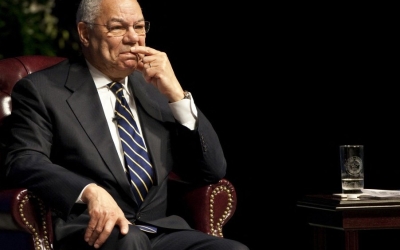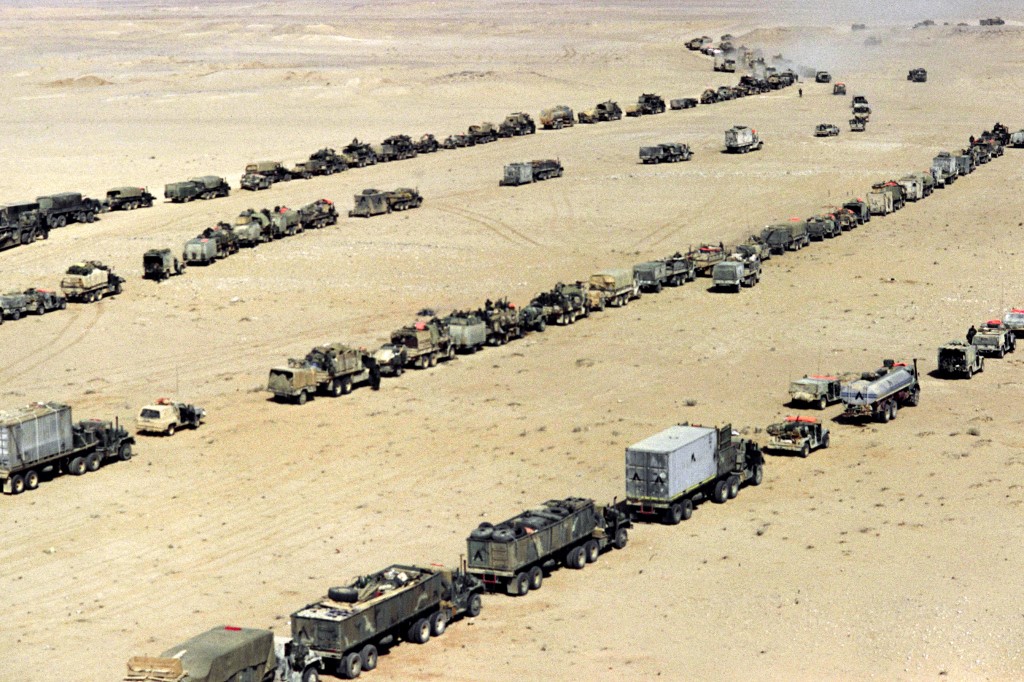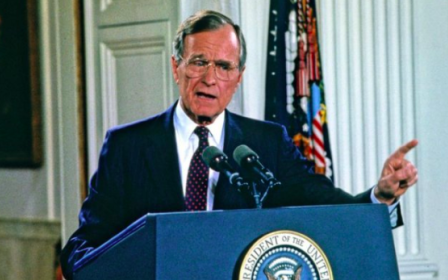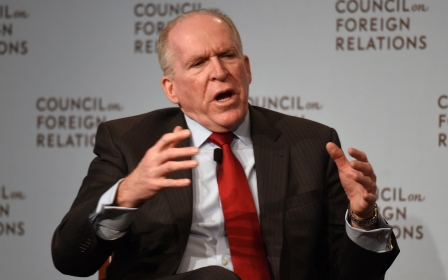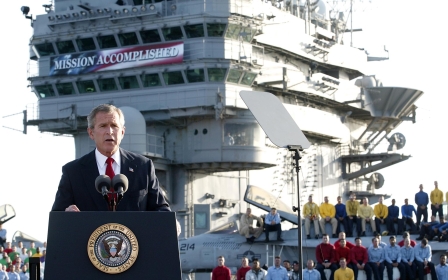Colin Powell: US general leaves behind a bloody legacy in the Middle East
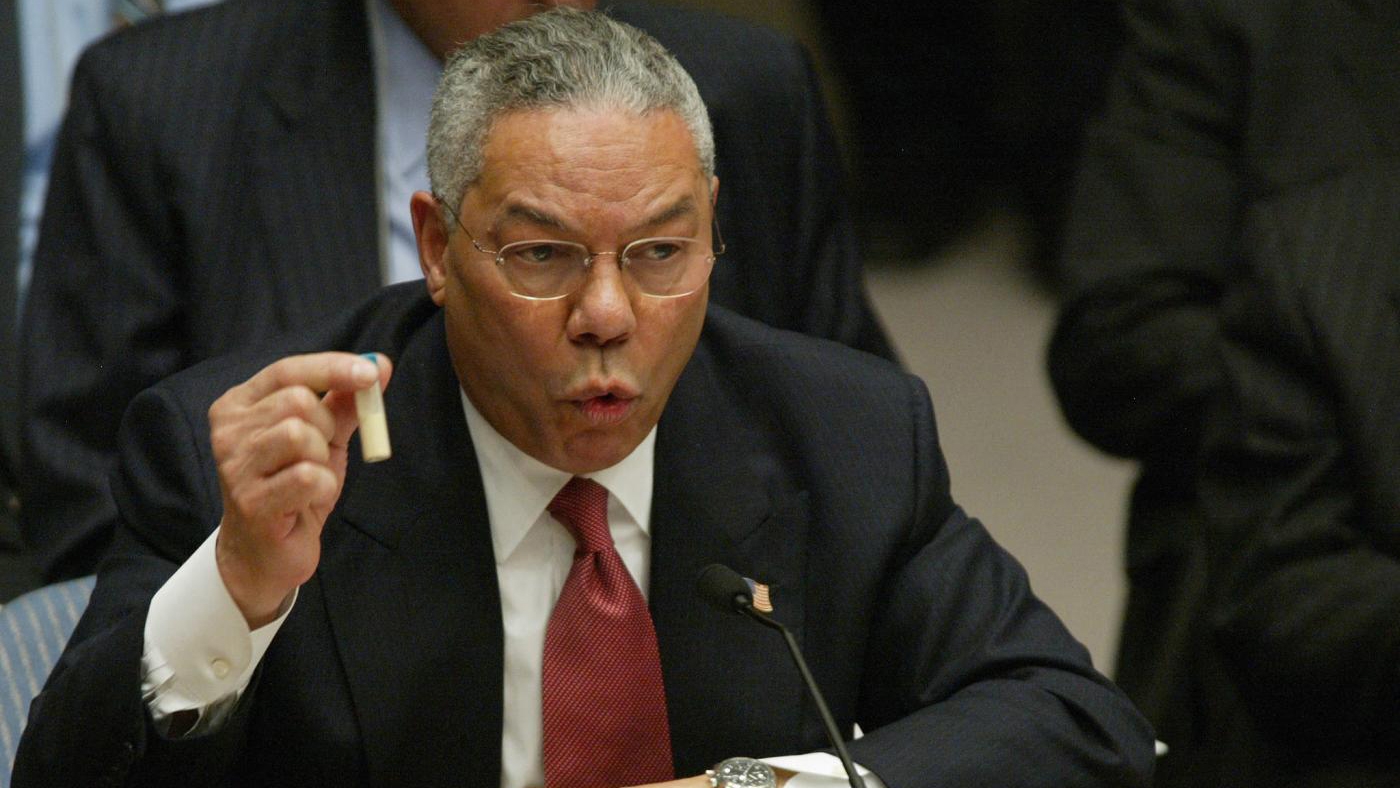
Colin Powell, a retired four-star US general, former White House national security adviser and former secretary of state, died on Monday after suffering complications from Covid-19.
Powell, who died at the age of 84, was seen by many in Washington as a great public servant and was referred to as one of the "finest Americans never to be President" by former UK Prime Minister John Major.
But he leaves behind a bloody legacy in the Middle East - most notoriously his speech to the United Nations in 2003 in which he promoted false intelligence while making the case for the invasion of Iraq that led to the deaths of hundreds of thousands of Iraqi civilians.
Powell's experiences as a young soldier fighting in the Vietnam War led him to develop what became known as the "Powell Doctrine", a view by the general that if the United States had to intervene in a foreign conflict, it should deploy overwhelming force with mass troop deployment to crush its adversary based on clear political objectives.
This idea would be the guiding force for Powell as he rose through the ranks of the US military and later the American government and helped lead the country through various conflicts and operations in the Middle East.
In 1986, while serving as an aide to then-Secretary of Defence Caspar Weinberger, Powell helped coordinate a series of air strikes in Libya in retaliation for the bombing of a West Berlin nightclub that killed three people, including two US servicemen. Washington blamed then-Libyan leader Muammar Gaddafi for the attack.
The strikes dropped 60 tonnes of bombs on the country and are believed to have killed a dozen Libyan soldiers. The bombings also hit a number of residential buildings and killed an unknown number of Libyan civilians.
Despite the civilian deaths, the attack was deemed a "success" and Powell would move on to bigger roles in the US military.
First Gulf War
While serving as chairman of the Joint Chiefs of Staff, Powell oversaw the US invasion of Panama - seen by some legal scholars as a violation of international law - as well as Operation Desert Shield, the initial phase of the First Gulf War, a crucial moment in the modern history of Iraq and for the Middle East.
Fearing that Iraq's leader Saddam Hussein would go into Saudi Arabia after occupying Kuwait in 1990, the US launched an international coalition against Baghdad and amassed troops inside the Gulf kingdom.
The ground operation, launched on 24 February 1991, lasted 100 hours and cost the lives of 148 US soldiers and 20,000 Iraqi troops. Some 88,500 tonnes of bombs were dropped on Iraq and Kuwait in January and February of that year, and the US claimed itself victorious and Powell's popularity in America rose as a result.
"Our strategy to go after this army is very, very simple," he said during a news conference after the start of the war in January 1991.
"First, we're going to cut it off, and then we’re going to kill it."
Invading Iraq
Twelve years later, Powell's most infamous moment was his defence of the decision to invade Iraq in 2003.
That year, as secretary of state he presented to the UN Security Council the case for the US war against Baghdad. He cited false information, claiming Saddam had secretly stashed weapons of mass destruction.
"My colleagues, every statement I make today is backed up by sources, solid sources. These are not assertions. What we’re giving you are facts and conclusions based on solid intelligence," he said in his 75-minute speech to the international body.
The subsequent US-led war and occupation in Iraq dragged on for nearly a decade amid a grinding insurgency and led to the death of nearly 200,000 Iraqi civilians, as well as a number of cases of abuse including the torture of Iraqi prisoners by the US military at the Abu Ghraib prison.
He later called the speech a "blot" on his record, and in 2016 said the speech was a "great intelligence failure".
"I knew I didn't have any choice," Powell told The New York Times in July 2020.
"What choice did I have? He's the president," he said, in reference to former president George W Bush who had asked him to speak before the UN.
In addition to the hundreds of thousands of civilian deaths, the American invasion of Iraq is believed to be the cause for the rise of the Islamic State (IS) group, which took over swathes of Iraq and neighbouring Syria and prompted another US-led coalition to intervene in the country again.
Defending drones
While the false information he presented to the UN tarnished his legacy, after several years out of office, Powell began to reemerge onto the American political scene.
'Drones are a very, very effective weapon and we will continue to use them'
- Colin Powell
Despite being a Republican, he backed former US President Barack Obama's campaign in 2008 and later backed Democratic nominee Hilliary Clinton for president in 2016.
As he came back into the spotlight as a moderate voice in American politics, Powell was also supportive of the Obama administration's use of armed drone strikes, which had resulted in scores of civilian casualties and was rife with a lack of transparency.
"[Obama] made it clear that there are still enemies out there that we have to deal with but we have to be more careful in the use of force, especially with respect to drones," he said in 2013.
"Drones are a very, very effective weapon and we will continue to use them but in a more circumscribed manner to make sure that we are going after high-value targets that present a real immediate threat to us."
According to an investigation by Airwars, the US has conducted at least 91,340 air and drone strikes since 2001, killing at least 22,679 civilians and potentially as many as 48,308.
This article is available in French on Middle East Eye French edition.
Middle East Eye delivers independent and unrivalled coverage and analysis of the Middle East, North Africa and beyond. To learn more about republishing this content and the associated fees, please fill out this form. More about MEE can be found here.


